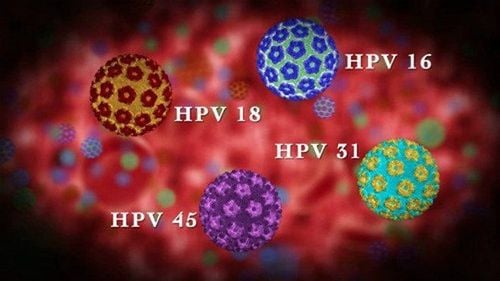This is an automatically translated article.
Posted by Doctor Nguyen Thi Thuy Hang - Laboratory Department - Vinmec Times City International General HospitalCervical cancer is the 4th most common cancer among women. In 2018, worldwide there were approximately 570,000 new cases of cervical cancer and 311,000 deaths. But cervical cancer is considered a preventable cancer.
1. What is cervical cancer?
Cervical cancer is a very common malignancy in women, the disease is caused by cells in the cervix that begin to grow beyond the body's control. quickly and create tumors in the cervix, the disease usually develops slowly over a long period of time, the cells in the cervix will change abnormally due to HPV infection or changes in the negative environment. religion.
Some warning signs of cervical cancer:
Abnormal vaginal bleeding Pelvic pain Abnormal urination, leg swelling Abnormal vaginal discharge Abnormal menstrual cycle Back pain, anemia

Chu kì kinh nguyệt bất thường có thể là dấu hiệu của ung thư cổ tử cung
2. HPV genotyping in cervical cancer screening
HPV (Human Papillomavirus) is the main cause of cervical cancer. HPV is spread through sex and causes genital warts, cervical ectropion, and cervical cancer. It usually takes about 5-20 years for a persistent HPV infection to progress to cancer. Therefore, the World Health Organization recommends that all women over the age of 30 have an HPV test to screen for cervical cancer early.
There are more than 100 types of HPV, of which more than 40 types are related to genital lesions, divided into 2 important groups:
Low-risk HPV types : Can cause genital warts or severe cell changes cervical warts, including: types 6, 11, 40, 42, 43, 44, 53, 54, 61, 72, 73 and 81. HPV types 6 and 11 are present in nearly 90% of cases of genital warts chicken . High-risk HPV types: Can cause cervical cancer, including: types 16, 18, 31, 33, 35, 39, 45, 51, 52, 56, 58, 59, 66 and 68. HPV types 16 and 18 are the deadliest, found in more than 70% of cases of cervical cancer.

Có hơn 100 type HPV
Currently, the Laboratory of Laboratory, Vinmec International General Hospital is performing routine HPV genotype testing on the automatic system of Seegene (Korea) which has been certified CE-IVD. This technique is based on the principle of Real-time PCR, has higher sensitivity, specificity and feasibility than conventional PCR in detecting HPV infection and genotype, and can simultaneously detect 28 other types. It includes all types in the low-risk and high-risk groups.
Vinmec International General Hospital currently has a package for screening and early detection of gynecological cancer for female customers over 40 years old, with the following meanings:
Gynecological function test. Carry out necessary tests to help detect early diseases: cervical - uterine - ovarian cancer even when there are no symptoms.

Vinmec có gói tầm soát và phát hiện sớm ung thư phụ khoa cho khách hành trên 40 tuổi
When cervical cancer screening at Vinmec, customers can apply the ThinPrep Pap Test for early detection of cervical cancer, a method approved by the US Food and Drug Administration (FDA). In use since May 1996. This new method is currently being used widely in the US and Europe. ThinPrep Pap Test has changed the traditional Pap smear method, through membrane controlled cell transfer technology, increasing the sensitivity and specificity in detecting precancerous cells. , especially adenocarcinoma cells, a type of cancer cell that is difficult to detect. At the same time, it is possible to perform an HPV test to identify women infected with high-risk HPV groups that cause cervical cancer.
To register for examination and treatment at Vinmec International General Hospital, you can contact Vinmec Health System nationwide, or register online HERE.














